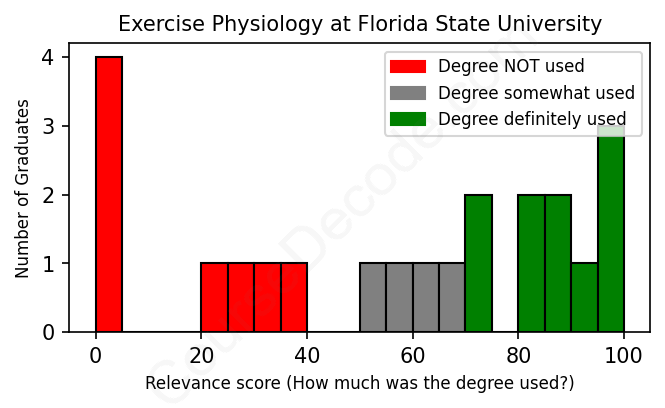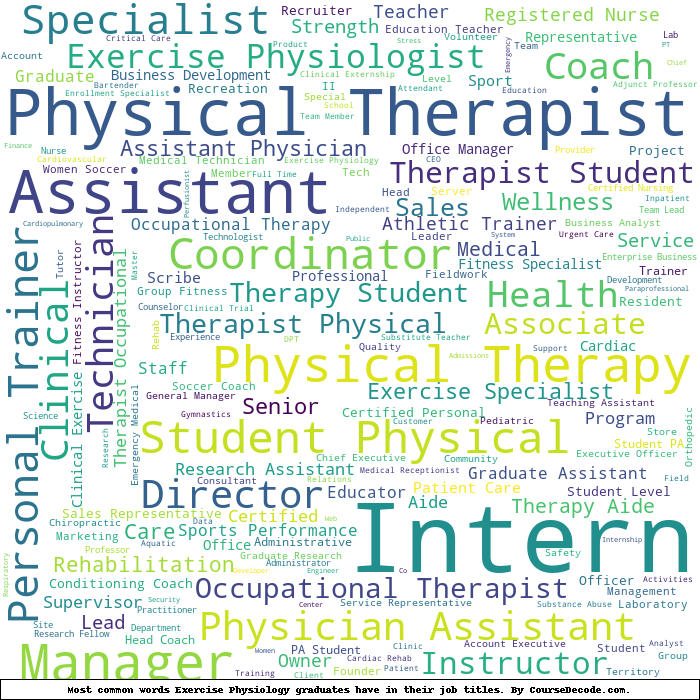
First, some facts. Of the Exercise Physiology graduates from Florida State University we've analyzed , here's how many have used (or NOT used) their degree in their career:

These are estimates based on AI analysis of 22 LinkedIn profiles (see below).
The verdict? Significantly below average. Overall, with an average relevance score of 55%, Exercise Physiology graduates from Florida State University have a much lower likelihood (-12%) of finding work in this field compared to the average graduate across all fields:
And for comparison, here's the chart for all profiles we've looked at across all degrees.
Also, after graduating, 72% of these graduates have pursued further education other than another Bachelor's degree (such as a Masters degree or other), compared to the average across all profiles of 35%. This suggests you may need more than just a Bachelors degree to be competitive as a Exercise Physiology graduate.
See the details:
|
Relevance score: 60% We think this person has gone into a career only somewhat relevant to their degree. We think this person has gone into a career only somewhat relevant to their degree.
DEGREE INFOGraduated in 2019 from Florida State University with a Bachelor of Science - BS in Exercise Physiology. Also pursued further education since (see below). JOB HISTORY SINCE GRADUATIONSales Advisor H&M Jul 2020 - Dec 2020 Barista  Starbucks Aug 2020 - Dec 2020 Urgent Care Physician Assistant  CRH Healthcare, LLC Jul 2023 - Mar 2024 Urgent Care Physician Assistant  AFC Urgent Care Feb 2024 - Jun 2024 Urgent Care Physician Assistant  Sanitas Medical Center Jun 2024 - Present FURTHER DEGREES DONE SINCE GRADUATINGMaster's degreeMercer University 2021 - 2023 ABOUTNo information provided. |
The top 10 most common jobs done by the graduates we've analyzed (ranked most common to least) are:
The job profiles of individuals who studied Exercise Physiology at Florida State University showcase a mixed bag of career paths. Many graduates found themselves in roles that do not directly relate to their degree, such as payroll clerks, office managers, and administrative aides. These jobs tend to focus more on clerical or managerial skills rather than applying the scientific knowledge related to human physiology, fitness, and health that they learned during their studies. While some graduates ended up in unrelated areas, a notable number have pursued roles in health-related fields like physical therapy, emergency medical services, or as physician assistants, which leverage their exercise physiology background much more effectively.
It’s clear that there is a significant portion of graduates who transitioned into roles directly relevant to Exercise Physiology, especially in physical therapy and healthcare. Positions such as Exercise Specialists, Physical Therapists, and Physician Assistants utilize the principles of exercise physiology in their daily responsibilities, showcasing the practical application of their education. On the flip side, a fair number of graduates also ventured into fields that lack direct connections to their training, such as retail, real estate, and various administrative roles. Overall, while some have strayed from the core focus of their degree, many have found rewarding careers where they can apply their knowledge effectively.
Here is a visual representation of the most common words in job titles for Exercise Physiology graduates (this is across all Exercise Physiology graduates we've analyzed, not just those who went to Florida State University):

Graduates of Florida State University with a degree in Exercise Physiology seem to have a pretty varied career trajectory. Right out of college, many people land their first jobs in roles that either connect directly to healthcare or seem more administrative, like office management or administrative aide roles. While some push into exercise-specific fields like exercise specialists or similar positions, others wander into unexpected paths, such as working in payroll or as a research technician. It's a mixed bag when it comes to finding jobs that align perfectly with Exercise Physiology principles initially.
If we fast forward about five to ten years post-graduation, the pattern shifts a bit. Many alumni have settled into healthcare roles that are indeed more relevant to their studies, with quite a few becoming physician assistants, physical therapists, or working in related clinical research. However, there are also cases where graduates seemed to drift away from Exercise Physiology altogether—like those who became brokers or even general dentists. Overall, while a good number of graduates do carve out careers closely linked to their degree, there are many who explore diverse avenues, some of which may not directly relate to their Exercise Physiology background. So, if you’re thinking of this major, know that your path might take some twists and turns, but it can lead you to some solid career options in healthcare too!
So, diving into a Bachelor’s degree in Exercise Physiology at Florida State University is kind of like a mix of fun and challenge. On one hand, you’ll get to learn a lot about how the body works, which is super interesting if you’re into sports or health. But, it can definitely be demanding; you’ll have to tackle some tough science courses like anatomy, biology, and exercise science theory. Overall, I’d say it’s around average in difficulty—some people find it easier because they love the subject matter, while others might struggle with the heavy course load, especially the lab and practical components. Just be ready to put in some effort, and you’ll be fine!
Most commonly, in the LinkedIn profiles we've looked at, it takes people 4 years to finish a Bachelor degree in Exercise Physiology.
Based on the job histories of these Exercise Physiology graduates from Florida State University, it looks like some of them are doing pretty well financially, while others might be scratching their heads about their paychecks. For instance, the ones who hopped onto medical roles, like Physician Assistants and Physical Therapists, are likely pulling in decent salaries, especially compared to those in more administrative roles or internships that don’t pay as much. The early jobs, like Payroll Clerk or Office Manager, probably didn’t break the bank either, but it seems like many have made a solid leap into higher-earning positions with experience. Overall, it seems like the field can offer good opportunities, but it really depends on the specific path each graduate chose after graduation.
Here is a visual representation of the most common words seen in the "about" section of LinkedIn profiles who have a Bachelor degree in Exercise Physiology (this is across all Exercise Physiology graduates we've analyzed, not just those who went to Florida State University). This may or may not be useful:

Here are all colleges offering a Bachelor degree in Exercise Physiology (ordered by the average relevance score of their Exercise Physiology graduates, best to worst) where we have analyzed at least 10 of their graduates:
| College | Score | Count |
|---|---|---|
 East Carolina University East Carolina University
|
70 | 15 |
 California State University-Chico California State University-Chico
|
70 | 11 |
 University of Massachusetts Lowell University of Massachusetts Lowell
|
66 | 15 |
 West Virginia University West Virginia University
|
63 | 23 |
 University of Miami University of Miami
|
59 | 11 |
 Florida State University Florida State University
|
55 | 22 |
 Ohio University Ohio University
|
55 | 13 |
 Brigham Young University - Idaho Brigham Young University - Idaho
|
40 | 21 |